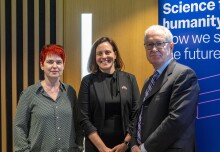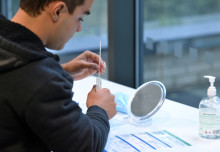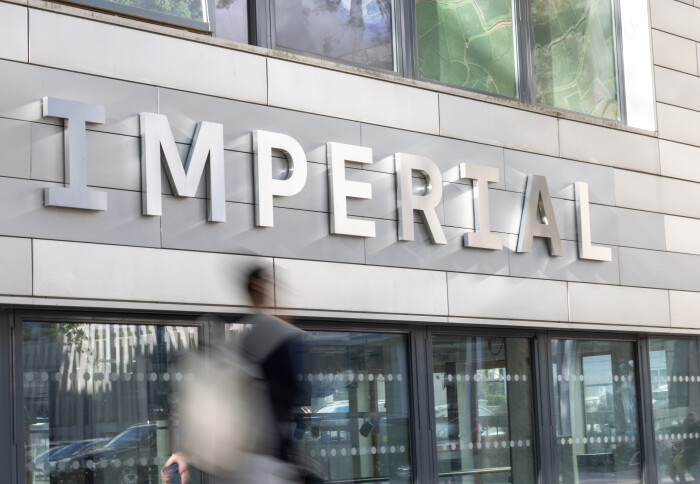

Imperial experts in medicine, maths and engineering have been announced as new Fellows of the Royal Society.
The seven Imperial researchers elected as Fellows this year are drawn from fields including public health, infectious disease, civil engineering, neuroscience and maths. They join more than 70 members of staff at Imperial College London able to use the prestigious ‘FRS’ suffix in their titles.
Fellowships are given to distinguished scientists by the Royal Society in recognition of "contributions to science, both in fundamental research resulting in greater understanding, and also in leading and directing scientific and technological progress in industry and research establishments”.
"Impact, innovation, and scientific imagination are Imperial's DNA. I’m incredibly proud of all seven of our researchers whose achievements have been recognised by the Royal Society today." Professor Ian Walmsley Provost of Imperial College London
This year over 90 exceptional researchers from across the world have been elected as Fellows, including one of the Nobel Prize-winning pair who discovered CRISPR, Professor Emmanuelle Charpentier, and former Chief Scientific Advisor to the US President, Professor Anthony Fauci.
President of the Royal Society, Sir Adrian Smith, said: “I am pleased to welcome such an outstanding group into the Fellowship of the Royal Society. This new cohort have already made significant contributions to our understanding of the world around us and continue to push the boundaries of possibility in academic research and industry.
“From visualising the sharp rise in global temperatures since the industrial revolution to leading the response to the COVID-19 pandemic, their diverse range of expertise is furthering human understanding and helping to address some of our greatest challenges. It is an honour to have them join the Fellowship.”
Professor Ian Walmsley, Provost of Imperial College London, said: “Impact, innovation, and scientific imagination are Imperial's DNA. I’m incredibly proud of all seven of our researchers whose achievements have been recognised by the Royal Society today – each new Fellow demonstrates this Imperial spirit to the fullest extent.”
Professor Xiaodong Zhang
 Professor Zhang is Professor of Macromolecular Structure and Function at Imperial’s Department of Infectious Disease and currently seconded to The Francis Crick Institute. Her research focuses on unravelling the mechanism of macromolecular complexes using X-ray crystallography and cryo-electron microscopy techniques. Professor Zhang’s work on the process of transcription regulation in bacteria has provided fundamental insights into how bacteria initially silence groups of genes responsible for stress response, and how they are turned on by special factors.
Professor Zhang is Professor of Macromolecular Structure and Function at Imperial’s Department of Infectious Disease and currently seconded to The Francis Crick Institute. Her research focuses on unravelling the mechanism of macromolecular complexes using X-ray crystallography and cryo-electron microscopy techniques. Professor Zhang’s work on the process of transcription regulation in bacteria has provided fundamental insights into how bacteria initially silence groups of genes responsible for stress response, and how they are turned on by special factors.
Most recently she has been seeking to understand how cells react to DNA damage, which can be caused by exposure to toxic chemicals, UV light or other radiation. With her team she is investigating the many macromolecular systems by which cells detect, process and repair their damaged DNA.
She commented: “I’m very honoured to be selected to join this prestigious Society. I’m particularly grateful - and humbled- to be recognised in this way by my distinguished scientific peers. I want to thank all the wonderful colleagues I have worked with.”
Professor William Wisden
 Professor Bill Wisden is Chair of Molecular Neuroscience within Imperial’s Department of Life Sciences and Interim Centre Director of the UK Dementia Research Institute at Imperial. His research is focused on understanding why we sleep, investigating the mechanisms underlying the sleep drive. While we spend one third of our lives in this state, the question of what exactly is causing our need to sleep remains unsolved.
Professor Bill Wisden is Chair of Molecular Neuroscience within Imperial’s Department of Life Sciences and Interim Centre Director of the UK Dementia Research Institute at Imperial. His research is focused on understanding why we sleep, investigating the mechanisms underlying the sleep drive. While we spend one third of our lives in this state, the question of what exactly is causing our need to sleep remains unsolved.
Professor Wisden’s work has contributed to core knowledge on how brain cells communicate, and how they generate sleep and wakefulness. It is hoped that this research, alongside the work of colleagues, on understanding how and why we sleep could eventually give insights into many aspects of health.
Professor Wisden said: “I am absolutely thrilled and delighted with this award. I would like to wholeheartedly thank all my colleagues and collaborators that I have worked with over the years that have made this award possible.”
Professor José Penadés
 Professor Penadés is Director of the Centre for Bacterial Resistance Biology at Imperial. His team’s work is focused bacterial virulence and how microbes share genes, enabling them to adapt, cause more severe disease, and become more resistant to drug treatments.
Professor Penadés is Director of the Centre for Bacterial Resistance Biology at Imperial. His team’s work is focused bacterial virulence and how microbes share genes, enabling them to adapt, cause more severe disease, and become more resistant to drug treatments.
The work was recognised recently with a grant from the European Research Council, which funded Prof Penadés to further untangle the systems which bacteria use to swap packets of DNA. Researchers believe the work could help us to better understand, and potentially tackle, the growing global threat of antimicrobial resistance (AMR).
Prof. Penadés said: "To become a Fellow of one of the oldest scientific societies in the world is a significant milestone for any scientist. I have spent my life studying microorganisms, and now join the society which helped microbiology to first emerge as a science, centuries ago. Bacteria are fundamental to life and with the threat of antimicrobial resistance looming large, understanding them better will be crucial to protecting our health now and in the future. I would like to thank my family, the present and past members of my lab, my collaborators, and as a Spaniard, this country for this extraordinary recognition. I’m proud to become a Fellow of the Royal Society, and to continue working and collaborating so closely with colleagues in Europe and around the world to help us understand microbes and their global impact".
Professor Richard Jardine
 Professor Jardine is a College Proconsul and Professor of Geomechanics in the Department of Civil and Environmental Engineering. His work focuses on the behaviour of geomaterials, and its application in issues including transport and urban infrastructure, the impact of climate change in cold regions, flood defences on difficult ground and, especially, marine geotechnics. His recent research has focused on achieving reliable and economical foundations for large new offshore wind farms developed in the North and Baltic Seas, the Taiwan Strait and offshore Japan.
Professor Jardine is a College Proconsul and Professor of Geomechanics in the Department of Civil and Environmental Engineering. His work focuses on the behaviour of geomaterials, and its application in issues including transport and urban infrastructure, the impact of climate change in cold regions, flood defences on difficult ground and, especially, marine geotechnics. His recent research has focused on achieving reliable and economical foundations for large new offshore wind farms developed in the North and Baltic Seas, the Taiwan Strait and offshore Japan.
Professor Jardine is also Fellow of the UK’s Institution of Civil Engineers, the Royal Academy of Engineering and the City and Guilds Institute.
Professor Jardine said: “It is very rewarding that our work has been recognised by the Royal Society in this way. Of course, much of the credit for this great honour is due to the wonderful, students, technicians and academic colleagues with whom I have worked over my four decades at Imperial”.
Professor Toby Gee
 Professor Toby Gee is a Professor of Pure Mathematics within Imperial’s Department of Mathematics. He did his PhD at Imperial from 2001-2004 and returned to the university in 2011.
Professor Toby Gee is a Professor of Pure Mathematics within Imperial’s Department of Mathematics. He did his PhD at Imperial from 2001-2004 and returned to the university in 2011.
Professor Gee works in the Langlands program, studying the interactions between p-adic Hodge theory and automorphic forms, in order to solve problems in number theory. Working with collaborators, he has resolved problems such as the Hasse-Weil conjecture for genus two curves - and recently constructed the "Emerton-Gee stack" with the University of Chicago’s Professor Matthew Emerton, which has transformed the study of p-adic Galois representations.
Professor Gee said: "I’m delighted to be elected to the Royal Society. I owe a great deal to all my collaborators on the work which has led to this honour, as well as to my family and friends for making this possible and encouraging me along the way.”
Professor Paul Elliott
 Professor Elliott is Chair in Epidemiology and Public Health Medicine within Imperial’s School of Public Health. His work focuses on the study of disease in populations, using large cohort studies to gain insights into the drivers, prevalence and distribution of disease in populations. He is also Director of the MRC Centre for Environment and Health, the UK Small Area Health Statistics Unit (SAHSU) and the REACT community surveillance study of COVID-19 across England.
Professor Elliott is Chair in Epidemiology and Public Health Medicine within Imperial’s School of Public Health. His work focuses on the study of disease in populations, using large cohort studies to gain insights into the drivers, prevalence and distribution of disease in populations. He is also Director of the MRC Centre for Environment and Health, the UK Small Area Health Statistics Unit (SAHSU) and the REACT community surveillance study of COVID-19 across England.
His work has helped to understand the role of salt intake in high blood pressure, explore potential links between mobile phone use and cancer, track the prevalence of COVID-19 during the pandemic and the lasting impact of Long COVID. He was recognised with the award of a CBE in the 2021 Queen's Birthday Honours List for services to scientific research in public health.
Prof. Elliot said: “It’s an honour to be elected to the Royal Society Fellowship. As scientists we are in the privileged position of being able to seek answers to some of the most interesting and difficult questions. In the area of public health research, the answers we find may ultimately help to inform people’s life and health choices. So to spend your career in this field and gain recognition for your contributions is truly humbling.”
Professor Martin Blunt
 Professor Blunt is Professor of Flow in Porous Media in Imperial’s Faculty of Engineering. He has pioneered high-resolution X-ray imaging, analysis and modelling of multiphase flow in porous materials. His research has applications in underground carbon dioxide and hydrogen storage, fluid recovery, groundwater transport, and the design of reactors and fibrous layers in fuel cells. He is also a Fellow of the Royal Academy of Engineering and Editor-in-Chief of the journal Transport in Porous Media.
Professor Blunt is Professor of Flow in Porous Media in Imperial’s Faculty of Engineering. He has pioneered high-resolution X-ray imaging, analysis and modelling of multiphase flow in porous materials. His research has applications in underground carbon dioxide and hydrogen storage, fluid recovery, groundwater transport, and the design of reactors and fibrous layers in fuel cells. He is also a Fellow of the Royal Academy of Engineering and Editor-in-Chief of the journal Transport in Porous Media.
Prof Blunt says: “At Imperial I have had the good fortune to work with exceptionally talented students and other colleagues. We have had the opportunity to work on some of the greatest scientific and engineering challenges of the 21st century, including how to avoid dangerous climate change, the generation of clean energy and preserving scarce water resources."
Article text (excluding photos or graphics) © Imperial College London.
Photos and graphics subject to third party copyright used with permission or © Imperial College London.
Reporters
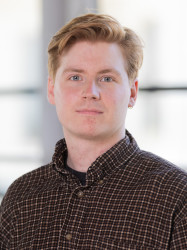
Conrad Duncan
Communications Division
Samantha Rey
Communications Division
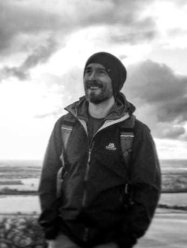
Ryan O'Hare
Communications Division

Contact details
Tel: +44 (0)20 7594 2410
Email: r.ohare@imperial.ac.uk
Show all stories by this author
Eleanor Green
Communications Division

